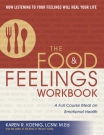 People living with troubling eating patterns are all individuals with different vulnerabilities and strengths. You may need to hear many voices speaking to healing and recovery before you hear the voice that touches you and awakens you to your eating disorder recovery path.
People living with troubling eating patterns are all individuals with different vulnerabilities and strengths. You may need to hear many voices speaking to healing and recovery before you hear the voice that touches you and awakens you to your eating disorder recovery path.
I'm happy to introduce you to the voice of Karen R. Koenig, LCSW, M.Ed. author of The Food and Feelings Workbook, who shares her thoughts about learning skills for recognizing and coping well with your emotions. It's my pleasure to welcome Karen as a guest author blogger on Eating Disorder Recovery for Women.
Learning the Tools of Emotional Management
by
Karen R. Koenig, LCSW, M.Ed.
If you binge, obsess about weight, or purge because you’re uncomfortable with your emotions, you’re not alone. For many folks, maneuvering through an inner world of emotions is confusing and overwhelming, and feelings are scary, unidentifiable, unmanageable, or unbearable. Fortunately, you can acquire emotional intelligence.
Like physical prowess and intellectual acuity, emotional intelligence comes with conscientious effort. First, you realize that you’re missing an integral way of interacting with the world. Then you identify the aspects of emotional management in which you’re challenged. Next you set out to acquire the skills or proficiency you’re lacking. And, finally, you practice, practice, practice. Really, emotions are no different than learning any other skill set.
It’s also important to understand that you lack effective affective skills because you weren’t taught them. I often ask clients, “Can you fly a plane?” Most answer no. “Why not?” I want to know. Most answer that no one ever taught them. This is precisely the problem you have with feelings. If your parents and other early caretakers didn’t model and teach you topnotch skills in handling the ups and downs of life when you were a child, where would you have learned them? They couldn’t teach you what they didn’t know themselves.
Now, like the rest of us, you’re scrambling to learn later in life what you weren’t taught earlier. Trust me, we’re all emotional management trainees of one sort or another. Some of us may have more grounding in the subject than others, but no one had a perfect emotional upbringing. There’s no shame in pursuing skills, only in refusing to admit your ignorance and remaining unskilled.
Two vital components in emotional management are knowing when to contain or minimize emotions and when to share or amplify them. Stiff-upper-lippers excel at one-half of the job: controlling emotions. Let-it-all-hang-outers have the other half down pat. To manage emotions, you need both—to recognize when to talk about feelings and share them with others, unburden yourself and reach out for understanding, validation and comfort and when to use your own resources to put hurt into perspective, distract yourself from internal distress, and soothe your own pain.
When you can both share your most vulnerable fears and hurts appropriately and count on you to get yourself through the night when others aren’t around, you’ll have an easier time not turning to food or weight obsession when you’re in emotional turmoil. Remember, there’s nothing wrong with you, no intrinsic deficit that makes you unable to function well without abusing food and your body. You’re simply unskilled and can learn what you don’t know. It helps to recall being unskilled in other areas—algebra, French, basketball free throws, calligraphy, whatever—and to note how through attention and practice you gained mastery and proficiency.
Put the same amount of attention and practice into learning emotional management, and you’ll find the world an easier and less painful place to live in and speed up your recovery. If you’re looking for a safe place to start this process, give my book, The Food and Feelings Workbook: a full-course meal on emotional health, 2007, Gurze Books a try. It offers a pre- and post-assessment, moves back and forth between talking about eating and emotions, has a slew of exercises for you to do, and will give you a great education on the subject.
Karen R. Koenig, LCSW, M.Ed., is an expert on the psychology of eating—the why and how of it—a four-book international author, psychotherapist, national speaker, and eating coach with a worldwide clientele. Visit her website at EatingNormal.com.


Add comment